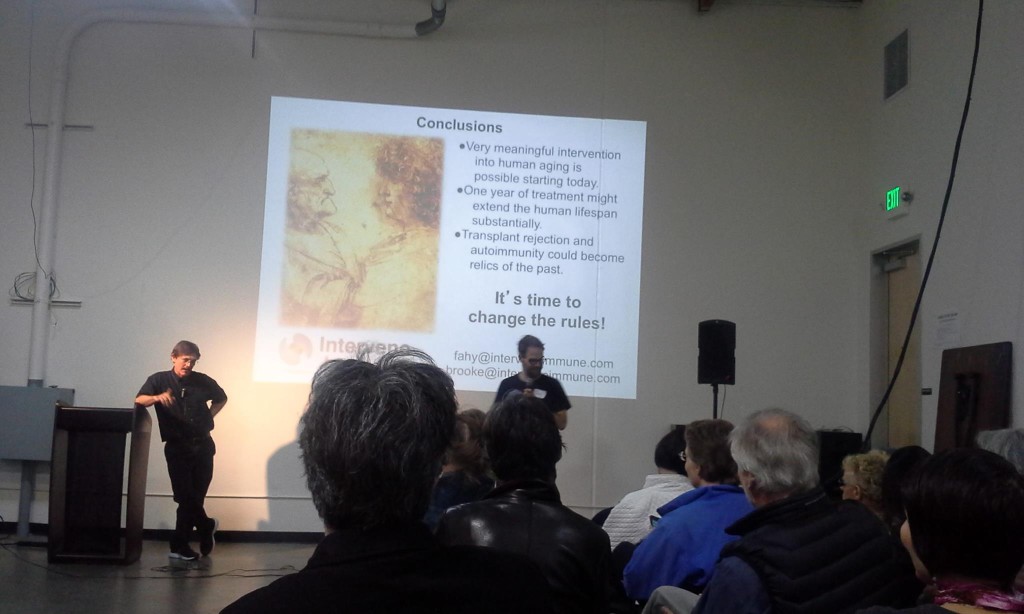I’ve been taking supplements for a long time now. Gretchen, my partner of many years, gave me a niacin flush back when we were in our 20s. I can’t say that I recommend it. Imagine taking enough niacin to turn bright red all over and feel as though your entire body was being pricked by needles for a couple of hours. Also, I just learned that the fact that I flushed at all is evidence that I probably wasn’t schizophrenic in the first place, which may come as a surprise to my friends from that time. I was even fed Flintstone’s chewable vitamins as a child, so I feel as though I grew up in a culture of supplementation. Why do I take them? To be healthier? More productive? To live longer? Take your pick.
So when I read Fantastic Voyage by Ray Kurzweil, it was right up my alley. I happily went out and bought the top twenty supplements that Ray & Terry were suggesting right away. My friend John warned me about this. He had initially tried the same strategy, but stopped in favor of eating whole foods. We haven’t learned enough about biology yet to know what will be effective, he said. But John had the discipline to sit and eat an entire tub of organic lettuce while chatting at my Futurist Meetup, and I doubted that I had his same level of resolve. So I reduced my confidence in supplements, but I figured they might help offset my shoddy diet.
As the years go by, more and more studies about supplements have shown a lack of efficacy or even detrimental effects. Of course I was quick to defend my beliefs and look for flaws in the studies, blissfully ignoring my own confirmation bias. Sure, the science is flawed in some cases. Maybe big pharma actually works to game the results since naturally occurring substances that can’t be patented could pose competition to its products if proven effective. But as irrational as I may be in defense of my pet concepts, my confidence in supplements erodes further and further over time.
But as irrational as I may be in defense of my pet concepts, my confidence in supplements erodes further and further over time.
In this Bay Area futurist scene, it isn’t hard to find plenty of folks looking for hacks to optimize their personal performance. Rationalists seem particularly fond of nootropics, etc. So my faith in supplements was bolstered somewhat by various things I learned. I might say, oh sure, maybe even mixed tocopherol vitamin E isn’t very effective, but surely this acetyl-glutathione will do the trick. You just need to find the right pill to pop.
As I got involved in Quantified Self, where everyone does self experimentation, I realized how utterly foolish I was being by not monitoring my biomarkers more frequently. Ray Kurzweil might choke down 200 pills a day, but he’s constantly getting blood work done and poring over the results. So my approach of performing a single liver test once a year wasn’t looking too responsible, especially when other QS’ers were monitoring their blood sugar in real time for kicks.
I also had jarring experiences trying to talk about supplementation with actual scientists. Several smart biologists mocked my supplement regimen. Recently, I was at a party and asked Joe Betts-LaCroix and some other science people if anyone followed the paleo diet or did supplements, and I was a bit surprised to find general disdain. Should we return to a paleo era life expectancy? Perhaps we should forego vaccines and sanitation as well? Joe referred me to his brief blog post on this topic, the gist of which being that although there are billions of people with a broad range of diets, no one population is extraordinarily long lived. Thus, we can assume that diet doesn’t contribute much to longevity.
Although there are billions of people with a broad range of diets, no one population is extraordinarily long lived. Thus, we can assume that diet doesn’t contribute much to longevity.
Now some might argue that this speaks to longevity, but not to performance. Maybe it can be shown that diet and supplements can improve performance. At one time I would have been more open to that idea, but I am starting to grow skeptical. Joe’s point is that folks should stop wasting large amounts of effort for small or nonexistent personal gains and should focus instead on the basic research needed to unlock the deep complexity in the foundations of our biology. Of course, not all of us are cut out to do that research.
Dan Millman actually touched on this point at Ted X Berkeley this year. Millman ponders the question of whether it is better to focus energy on improving the world or on improving ourselves. He concluded that self improvement gives us the leverage to change the world more effectively. I am no great fan of Millman’s productized philosophy. He’s like some of these other “gurus” who package up ideas as products and sell them in a way that seems as though they have never heard punk rock or read post-modernism. But I think I can agree with that point – self improvement lends leverage to our endeavors. The question then becomes a cost/benefit analysis. At what point does self improvement offer diminishing returns?
Joe is an interesting person to listen to in this regard. No one can accuse him of not working on himself. He was a big QS’er from the beginning and did calorie restriction for years. He does HIIT, and he even broke out and tried living a 28 hour day. He has also been working fervently to improve the world for years, from his work at the ill fated Halcyon Molecular to his current Health Extension Salon project to combat aging. Yet, here he is admonishing folks to stop piddling around with diet and supplements and get to work on the real problems of this world.
Then there is this other fellow I happen to know named Walter Funk. A friend shared an article about a TA-65 alternative supplement that can supposedly increase your telomeres and roll back aging. This seemed at first to be utter quackery, yet there in the references, low and behold, was a paper by the venerable Dr. Walter Funk. So I said, Walter, tell me, what is this nonsense? He said that the basis of TA-65 is astragalus and that it modestly but reproducibly increases telomerase activity (i.e. protects telemeres which keep your DNA from unraveling, sort of like the plastic on the tips of shoelaces). He pointed out that astragalus is just an herb and regulation of herbs is becoming lax, but that other organic compounds that are purported to increase telomere activity would require clinical trials for FDA approval.
Then I found this article which seemed to suggest that telomerase might contribute to the immortality of tumor cells. But Dr. Funk assured me that reasonable animal data suggested that telomerase might actually prevent cancer. The telomerase activation associated with tumors occurred at a later stage after a bunch of other damage had occurred. So I said, well, that sounds OK then. Do you take TA-65, Walter? But I got a sardonic reply about him relying on good women and the kindness of strangers. He also offered to forward me a summary of all the NIH supplement studies that showed no benefit or some detriment.
Furthermore, when Cynthia Kenyon spoke at the Health Extension Salon in July 2013, she mentioned a study which showed that antioxidants prevent the increase of insulin sensitivity following physical exercise. In other words, exercise causes stress which normally triggers your body to repair the damage, however, antioxidants seem to prevent your body from recognizing the damage that has occurred. So antioxidants fix some of the damage, but prevent your body from providing a more robust response. This goes hand in hand with recent research, which calls into question the long held belief that aging is caused by oxidative stress (or free radical damage). There’s something else going on here.
Recent research calls into question the long held belief that aging is caused by oxidative stress (or free radical damage).
Part of me wonders if there is something in the personalities of scientists that makes them disdain diet and supplementation. Gretchen suggested that they may all be absent minded professors forgetting that their brains are attached to bodies that need nutrients. The performance hackers seem like a more charismatic and risk tolerant crowd, almost thrill seeking, though I must say they seem to have fewer papers to their credit. At the end of the day, I suspect that scientists disdain diets and supplements because they hold assertions of efficacy to higher standards than many of us do. I strongly suggest that my fellow supplementers listen more closely to what the science is trying to tell us. I will attempt to do the same, although it sure isn’t easy to give up your imagined silver bullet.
Additional references:
Walter sent me these additional references for those of you who are still clinging to your vitamin bottles. (I probably need to read these myself in order to let go.)
Here’s the big flop of one of the most touted supplements, omega-3 for heart disease has absolutely no effect on normal individuals.
http://www.medpagetoday.com/Cardiology/Prevention/38969
No one, especially males, should take vitamin E (tocopherol).
http://www.cancer.gov/newscenter/newsfromnci/2011/SELECTupdateJAMAOct2011
Antioxidants have been shown to not help with cancer.
http://www.cancer.gov/cancertopics/factsheet/prevention/antioxidants
An attack on the low carb crowd from a microbiome investigator.
http://humanfoodproject.com/sorry-low-carbers-your-microbiome-is-just-not-that-into-you
 Luckily, I heard a “Giving Thanks” show on NPR featuring actress Julia Sweeney, who created the androgynous character Pat on Saturday Night Live. She talked about some of the things she was grateful for. My favorite offering by Sweeney was that she was thankful for the margin for error that her life allowed her. I can relate to that. I am truly grateful that I have been able to make mistakes in my own life and have still been able to flourish. So many folks in the Global South live on the knife’s edge, where mistakes are impossible to recover from. Another great point Sweeney made was that she was grateful for a stable community. Consider all the folks who live in war zones from Afghanistan to Somalia. Even here in Oakland, many folks must feel they are in a war zone with all the murders going on.
Luckily, I heard a “Giving Thanks” show on NPR featuring actress Julia Sweeney, who created the androgynous character Pat on Saturday Night Live. She talked about some of the things she was grateful for. My favorite offering by Sweeney was that she was thankful for the margin for error that her life allowed her. I can relate to that. I am truly grateful that I have been able to make mistakes in my own life and have still been able to flourish. So many folks in the Global South live on the knife’s edge, where mistakes are impossible to recover from. Another great point Sweeney made was that she was grateful for a stable community. Consider all the folks who live in war zones from Afghanistan to Somalia. Even here in Oakland, many folks must feel they are in a war zone with all the murders going on.

